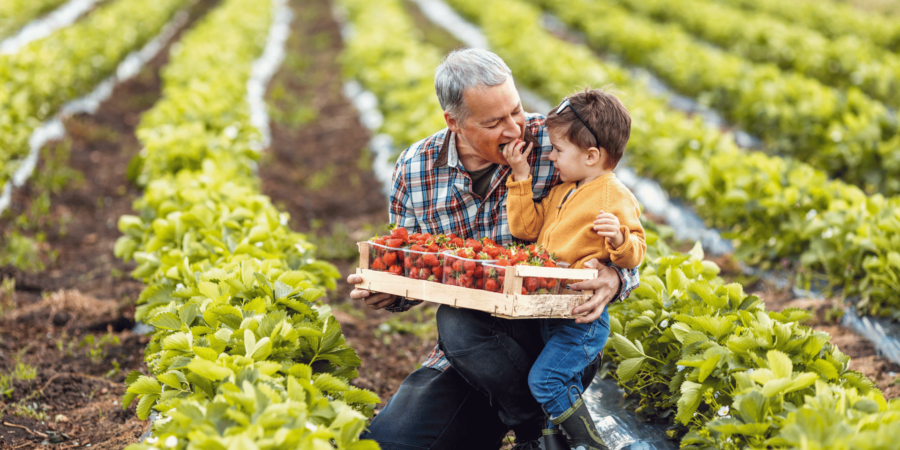Sustainable and Organic Farming in Türkiye
Sustainable and Organic Farming in Türkiye
Doğancan Çelik
According to Worldometers (2023), the world population has reached 8 billion. As per the UNFPA (2023), it took hundreds of thousands of years for the population to reach 1 billion, but the sevenfold increase in the population in the last 200 years has caused significant changes. Feeding the rapidly increasing population required changes in many aspects of agriculture and animal husbandry. Agricultural areas have been expanded, the crop-dusting and fertilizer industry have been developed, and efforts to improve efficiency have been accelerated. However, the use of chemicals to increase productivity in agriculture has reached a level that threatens human health and the sustainable use of the soil. It can be said that the debates on nature protection and access to healthy food have brought the concepts of organic farming and sustainable farming to the world’s agenda.
Sustainable and organic farming in Türkiye practices are becoming increasingly important, as both farmers and consumers recognize the benefits for the environment and human health. Organic farming in Türkiye began in 2005, with 14,401 farmers producing 421,934 tons on 203,811 hectares of land. By 2018, this had grown to 79,563 farmers producing 2,371,612 tons on an area of 626,885 hectares, as reported by TUIK.

Sustainable and Organic Farming in Türkiye
Sustainable agriculture, in its simplest sense, aims to avoid polluting the soil with harmful chemicals and produce crops in a way that will yield high returns in the coming years without causing permanent damage to the soil. However, without any state monitoring mechanisms in place, this is often easier said than done. The rapid development in the field of organic farming has brought with it legal regulations. The “Organic Agriculture Law” of 2004 established certain criteria and principles for organic farming. The law aims to audit and certify all stages of the production process, from harvesting without the use of chemicals and without harming the environment to processing, packaging, storage, and transportation of the product.
One of the main advantages of sustainable agriculture and organic farming is that it relies on natural processes and biodiversity to maintain soil fertility, control pests and diseases, and enhance crop yields. This helps to reduce the use of synthetic fertilizers and pesticides, which can harm the environment and contaminate food. Additionally, organic farming can also promote soil health and biodiversity, as well as water conservation, which is essential for food security and resilience to climate change.
Türkiye has a long history of farming customs, which are still used by many farmers today. However, the country has also seen a significant increase in the use of modern farming methods and chemicals in recent years, which has led to a decline in soil health and water quality. Therefore, the government and private sector are promoting sustainable and organic farming practices as a way to address these challenges and improve the competitiveness of the agricultural sector.

Organic Farming in Türkiye
The Turkish government supports organic farming through various policies and programs, such as subsidies, technical assistance, and training for farmers. Additionally, the government has established an organic certification system to ensure that products labeled as organic meet international standards.
Furthermore, private companies and organizations also play a critical role in promoting sustainable and organic farming in Türkiye. For example, companies invest in research and development to improve organic farming methods and market access for organic products. Additionally, many NGOs, cooperatives, and sustainability groups provide education and training on farming, as well as market development and promotion of organic products.
Despite the efforts made by the government and private organizations, organic farming remains a small portion of the total agricultural land in Türkiye. There are still several challenges that need to be addressed. However, there is a growing awareness and demand for organic products among Turkish consumers, which is expected to drive further growth in the organic farming sector.
According to the 2012-2016 Türkiye Organic Agriculture Strategic Plan, new establishments and organizations were created to support developments in organic agriculture in the world. The plan also highlighted the organic agriculture support and legislation in EU countries, as well as the potential for organic agriculture in Türkiye. The Organic Agriculture Information System (OTBIS), established in 2005, records all organic farming activities in the country. The plan includes goals such as following EU legislation, complying with international standards, developing and implementing projects, providing new training, increasing the capacity of auditors, organizing annual stakeholder meetings, establishing a database on organic agriculture, strengthening agricultural organizations, and promoting the consumption of organic products.
Under the 2018-2022 Strategic Plan, several plans for the dissemination and development of sustainable agriculture were shared, with a particular focus on increasing the number of farmers engaged in organic farming.
Conclusion
Türkiye has a diverse agricultural potential, with various products that can be grown in different regions and climates. The number of organic products produced in Türkiye increased from 8 in 1990 to 95 in 2000 and 205 in 2005. As of 2018, a total of 213 certified organic products were produced in Türkiye.
Aydın, İzmir, and Manisa provinces are leading in organic agriculture, with a focus on products grown in a Mediterranean climate, such as raisins, figs, cotton, wheat, olives, oranges, tomatoes, apples, and pine nuts. The Eastern Anatolia region has also gained attention in organic agriculture production in recent years, with cereals and fodder crops such as wheat, barley, sainfoin, oats, vetch, rye, meadow, and alfalfa being the leading products grown in these provinces.
Initially, organic agriculture production in Türkiye was driven by demand in foreign markets, but in recent years, there has been a rapidly increasing demand for organic agricultural products in the domestic market. This has led to an increase in the number of organic farmers in Türkiye, and it is expected that this trend will continue in the coming years.
Sustainable agriculture and organic farming practices are becoming increasingly important in Türkiye, as farmers and consumers recognize the benefits of these methods for both the environment and human health. The government and private sector are supporting organic farming through various policies and programs, and there is a growing awareness and demand for organic products among Turkish consumers. This is expected to drive further growth in the organic farming sector in the future.




